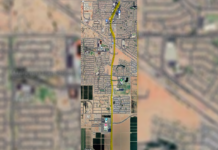
In a recent survey of City Council candidates’ top priorities for the city, all seven who responded had economic development goals in their Top 3. Councilman Kelly Haddad, who is running for re-election in March, listed it as his No. 1, stating that it would be a “catalyst” for fixing many other problems, most notably transportation.
Anthony Smith, who is running for mayor unopposed, stated, “I believe the next five years are critical for determining whether Maricopa becomes a growing employment center or merely a bedroom community to Phoenix. When campaigning, I have been using the term ‘economic magnet.’ This is to emphasize that I want Maricopa to be not only an economic center, but a preferred place that businesses are attracted to, like a magnet.”
Following are the City Council candidates’ positions on economic development:
Marvin Brown:
Any time an area transitions from rural and farming to light industry and retail, land cost factors into economic development. At the same time that the city of Maricopa is experiencing a population explosion, many states and cities are faced with budget shortfalls, including Arizona. Banks and investment houses such as Merrill Lynch, CitiGroup, Bank of America, Wachovia, Bear Stern and PNC have lost billions of dollars; as have Freddie Mac and Fannie Mae.
With the dollar’s loss of value and a severe credit crunch, it makes it difficult to plan for much economic expansion. Most of the tax breaks and federal aid given in the past several years have gone to wealthy transnational companies or individuals.
All of these factors influence a sustained economic development plan for a city. Additionally, more and more middle-class citizens are falling through the cracks.
Carl Diedrich:
We have a need for two things: No. 1, economic development: the visionary strategy for future industry and expansion in the Maricopa market, and No. 2, economic growth: a short-term tactical approach to enticing small and mid-level businesses to service our population base.
Economic development ultimately serves the purpose of providing jobs and a tax base to make Maricopa a sustainable, attractive location for expansive national and global companies. Having a seasoned economic development consultant such as Ioanna Morfessis to guide that process is essential to ensure our place in any future negotiations with high-dollar suitors.
The essential problem is that with a lack of economic growth, economic development slows or is non-existent. Long-term strategies fail because their foundations are laid in the dreams of the future and not the realities of today.
Our Economic Development Department must work to not only attract business, but also to attract investors and entrepreneurs looking to partner with the city and help build a viable infrastructure, conducive to strong economic development initiatives.
Will Dunn:
While Rome may have not been built in a day, Maricopa blossomed overnight. Thirty-thousand friends moved here, retail stores, small businesses and restaurants have opened; and while we would all like these necessities to continue opening even faster, in reality, much of what has happened has happened at warp speed.
We must continue pushing this retail commercial development. Maricopa has places to live, the beginning of places to shop but very few places to work. With your help, the help of one of the premier economic developers in America and focused responsible developmental aids, we are on the verge of being able to offer shovel-ready sites with utilities at hand to handle some major employers moving to Maricopa.
Our citizens are some of the most educated and skilled people in America, and we have what employers want, you. We’re close to pushing the infrastructure needs to areas slated for commercial development and those commercial developers and land owners in Maricopa are seeing the vision and following through with the work needed to make this a reality.
When you live, work and play in Maricopa you won’t have to waste precious hours driving. Instead, you will spend that time with your family.
Kelly Haddad:
This is where our attention needs to be focused. A well-thought out and executed economic development program can be a catalyst for fixing many of our other problems, primarily transportation.
Marty Hermanson:
Two years ago when my wife and I moved here, we kept hearing about all the businesses that were coming to Maricopa. There were to be shopping centers, restaurants, more parks for recreation events, and a development change in the city’s appearance. All of the above have been slow to develop.
We have two grocery stores, very few dining establishments except for fast food, and a few small stores where you can buy home furnishings or other items. We are a community that leaves the city for work, shopping, entertainment and dining. We are spending our money in other cities.
These next few years will determine whether we will become a growing employment center or merely a bedroom community. We need to not only attract businesses to open shops in Maricopa, but also to keep them here. The only way to build our economy in our city is to have opportunities to spend and invest in our city.
Camerino Lopez:
We need it! The difficult part is how we balance the growth. In the mix to consider are corporate business, locally-owned shops with the front counters manned by daring entrepreneurs, local contractors and other service providers.
We benefit in the short term from immediate capital that can be associated with corporate or franchise businesses. Land is being sold, developed and leased downtown and on the highways east and west.
Maricopa needs to encourage small business and, if necessary, make concessions to qualifying owners to help keep the local economy local. This could be in the form of financial aid or a decrease in taxes for the first year or two.
That goes for our local contractors. Every day I see work trucks leave the city to have others enter. What a waste of resources. That commute time could be spent getting the family ready for their day, not to mention reduce the amount of pollution generated in and around the city. Is it possible to have developers use local contractors as a percentage of their subcontracting? I think so.
Editor’s note: Candidates Marquisha Griffin and Robert Lewis did not respond.






![In mayoral race, it’s the Nancy Smith show Maricopa Chamber of Commerce Executive Director Kelly Anderson grills incumbent Mayor Nancy Smith in election's first campaign event April 30, 2024, at Southern Dunes Golf Club. [Elias Weiss]](https://www.inmaricopa.com/wp-content/uploads/2024/04/CRM_1009-218x150.jpg)
![Merging lanes incite more 347 anger A merging lane sign sits on the side of State Route 347 northbound lanes during evening traffic on April 30, 2024. [Monica D. Spencer]](https://www.inmaricopa.com/wp-content/uploads/2024/04/spencer-043024-adot-merging-lanes-347-web-218x150.jpg)



![City gave new manager big low-interest home loan City Manager Ben Bitter speaks during a Chamber of Commerce event at Global Water Resources on April 11, 2024. Bitter discussed the current state of economic development in Maricopa, as well as hinting at lowering property tax rates again. [Monica D. Spencer]](https://www.inmaricopa.com/wp-content/uploads/2024/04/spencer-041124-ben-bitter-chamber-property-taxes-web-218x150.jpg)





